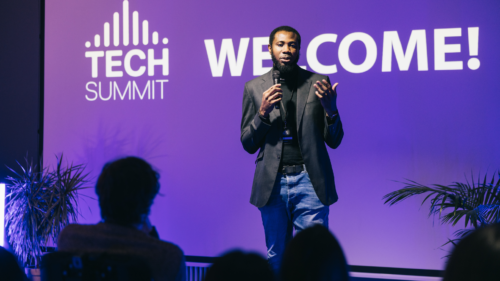
Omidyar Network today announced a new initiative: The Tech We Want, a four-year, $8 million portfolio of work focused on connecting and empowering a new wave of leaders, companies, and technologies that are built on inclusivity, mutualism, sustainability, accountability, and responsible innovation. The Tech We Want program is designed to build community, infrastructure, and a shared narrative in support of technologists, thought leaders, and investors who are pursuing healthy alternatives to the dominant tech culture.
“If we want to develop a responsible tech future, we have to intentionally change who and what we produce. We need to support diverse organizations and inclusive communities working to redefine what technology culture can and should be,” said Michele Lawrence Jawando, Senior Vice President of Programs at Omidyar Network. “As a social change venture, we have the opportunity and responsibility to invest in tech leaders with lived experiences, help them build collective power, and support their vision for a trustworthy tech future.”
To realize this vision, Omidyar Network has engaged a diverse group of entrepreneurs, funders, thinkers, creatives, and builders whose ideas, models, and networks have changed the way many think tech should be built and how the system should operate. The first 15 “Luminaries” will co-create a collective vision for ethical technology, systems, and economies that generate value for all stakeholders, including technology creators, consumers, workers, communities, and the planet. Through this partnership, Omidyar Network hopes examples of what we — as an industry and society — want to reward and correct will emerge, and philanthropy can work in coalition to support their vision, innovation, and collective well-being.
“With moral imagination, the tech we want — and need — can be built for and with sustainable growth, patient capital, regeneration, value for ‘enough’, win-win mindsets, trusting relationships, distributed power, and shared ownership,” said Aniyia Williams, a principal on Omidyar Network’s Responsible Technology team who leads The Tech We Want. “In contrast, today’s tech system is built on models of exponential growth, fast capital, extraction, assumptions that ‘more/bigger’ is better, zero-sum mindsets, transactional relationships, and dominance. These values have failed to deliver a healthy, trustworthy, inclusive, and equitable system and outcomes.”
The Tech We Want Luminaries (2022–2023)
Emily Best: Founder and CEO of Seed&Spark, a platform launched ten years ago to make entertainment more diverse, inclusive, connected, and essential. She is a filmmaker, entrepreneur, active board member of many community organizations, and believer in storytelling as an essential driver to building equity and sustainability for everyone.
Kelly Burton: CEO of Black Innovation Alliance, a national coalition made up of 65 Black-led organizations which support more than 300,000 innovators of color across the country. She is a political scientist, serial entrepreneur, and change agent who leads with passion, purpose, and vision.
Jenifer Daniels: Executive director of Talk Tech, a nonprofit focused on using data-driven stories to close the funding gap for Black tech founders building high-growth businesses. She is also an angel investor of under-resourced startup founders.
Coraline Ada Ehmke: Founder and executive director of the Organization for Ethical Source, whose mission is to empower open-source communities to ensure that their work is being used for social good and in service of human rights. She is an internationally recognized engineer, speaker, and activist with over 25 years of industry experience.
Lilibeth Gangas: Chief technology community officer at the Kapor Center, an operating foundation at the intersection of technology and racial justice. She provides research and thought leadership, operating programs, supporting strategic partnerships, and investments to increase diversity across the tech system.
Jessica Mason: Executive Director of Start.coop, a nonprofit organization cultivating the next generation of cooperatively-owned businesses with ambitions of scale. She is an impact strategist, entrepreneur, educator, and angel investor with deep experience leading innovation ventures in the social and public sector.
Andy Moss: Professor of social entrepreneurship at NYU, founder of CORMethod.org (tools for operationalizing the pursuit of purpose), and board member of the Jericho Project and Govern for America. He also spent 17 years developing and managing new businesses at Microsoft; founded and sold his own startup; and advised numerous startup ventures.
Dr. Safiya Noble: Author, Professor at UCLA, and Director of the National Center on Race and Digital Justice — a groundbreaking effort that focuses on accountability and repair from extant and emerging digital harms. She was recognized last year as a 2021 MacArthur Foundation Fellow and honored with the inaugural NAACP-Archewell Digital Civil Rights Award.
Ifeoma Ozoma: Founder and principal of Earthseed, a firm specializing in tech accountability and public policy. She is a co-sponsor of the Silenced No More Act, the creator of the Tech Worker Handbook, and co-founder of the Transparency in Employment Agreements Coalition.
Ellen Pao: CEO of Project Include, a DEI non-profit that collects, analyzes, and shares data to recommend actions and benchmarks for tech startups. Her efforts to end workplace discrimination have led to the term “Pao effect.”
Eli Pariser: Co-director of New_Public, a project focused on building more flourishing and equitable digital spaces. He is an active author, activist, and entrepreneur focused on how to make technology and media serve democracy.
Jasmine Sun: Co-founder and director of Reboot, a nonprofit publication and community for young technologists reimagining techno-optimism for a better collective future. She has also worked in product, research, writing, and education roles at Substack, Schmidt Futures, Stanford University, and beyond.
Aden Van Noppen: Co-director of Mobius, a home for people creating Liberatory Technology products, systems, and narratives. She supports the Mobius community with the relational, intellectual, spiritual, and financial resources needed to create a compassionate, accountable, and just technology system.
Xiaowei R. Wang: Lead steward of Logic School, an organizing community for tech workers. Their work centers community-based tech and the importance of care in organizing for a more just future.
Mara Zepeda: Co-founder and managing director of Zebras Unite, a co-op creating the capital, culture, and community for the next economy. She also co-authored “Zebras Fix What Unicorns Break,” a manifesto on the broken structure of technology and venture capital.
The program’s other partners and collaborators include:
To learn more about the Luminaries and follow the group’s progress, visit www.thetechwewant.com.

